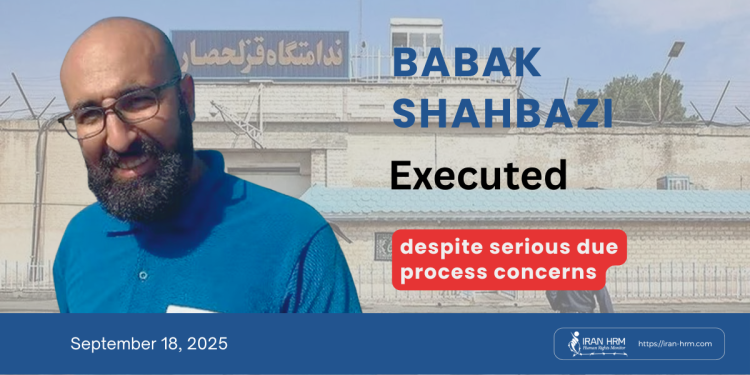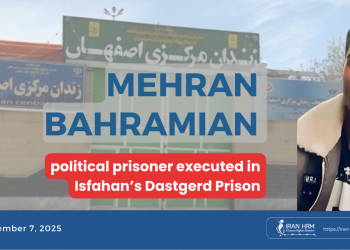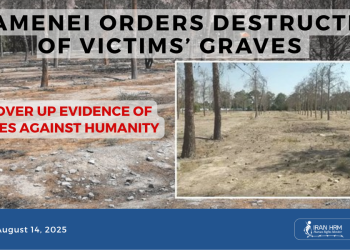The Iranian judiciary has confirmed the execution of Babak Shahbazi, a 44-year-old air conditioning technician and father of two, in Qezel Hesar Prison in the early hours of Wednesday, September 17, 2025. His death sentence was carried out following a controversial trial and judicial process that human rights observers have widely criticized for serious violations of due process.
Shahbazi was arrested in January 2024 and held for several months under intense interrogation. He was later tried at Branch 15 of the Tehran Revolutionary Court, presided over by Judge Abolqasem Salavati—a figure notorious for issuing harsh sentences in politically sensitive cases. In May 2025, the court sentenced Shahbazi to death on charges of “corruption on earth” (efsad-e fel-arz) and “espionage for Israel.”
Shahbazi’s family has consistently rejected the charges, describing them as “absurd and baseless.” During the trial, it was alleged that he had been trained by Israel to use basic office software such as Microsoft Word. The implausibility of this claim sparked widespread ridicule and disbelief among the Iranian public, casting further doubt on the legitimacy of the prosecution’s case.
Prisoner Protest at Qezel Hesar
On the evening of Tuesday, September 16, hours before the execution, Shahbazi’s fellow inmates staged a sit-in protest in front of the office of Ward 4’s head. The protest reportedly lasted several hours, with prisoners chanting and voicing strong opposition to the implementation of the death sentence. According to informed sources, fellow prisoners argued that Shahbazi’s sentence was unjust and violated the most fundamental principles of human rights.
A Judicial Process Marked by Irregularities
Shahbazi’s legal case has been widely criticized for a lack of transparency and fair trial standards. His third request for retrial was recently rejected by Branch 29 of the Supreme Court, which declared the application “inadmissible.” The court claimed that defense attorneys Milad Panahipour and Mohammad Saleh Noghrehkar had failed to attach essential documents, including previous verdicts from the Revolutionary Court and the Supreme Court.
The ruling, signed by Chief Judge Abbasali Alizadeh and Associate Judge Reza Hatami, stated that the attorneys’ submissions “lacked legal justification” and were “inadequate for issuing a lawful verdict.” Critics have pointed out, however, that courts under Judge Salavati frequently deny defendants or their legal teams access to original verdict documents, permitting only handwritten copies. Therefore, the court’s reasoning based on the absence of attached documents is viewed by legal experts as procedurally and ethically flawed.
Execution Carried Out in Silence
Following the Supreme Court’s rejection, Shahbazi’s death sentence was considered final, and concerns over its imminent implementation grew in recent weeks. Sources report that he was taken out of his ward multiple times under the pretense of being transferred to the Ministry of Intelligence, but was in fact being moved to solitary confinement for possible execution.
Ultimately, his execution was confirmed on Wednesday morning, September 17, 2025, by the judiciary’s official news outlet, Mizan News Agency.
🧵The Iranian authorities’ arbitrary execution of Babak Shahbazi on 17 September is utterly horrific. He was sentenced to death by a Revolutionary Court after a grossly unfair trial in which the authorities never investigated his torture. 1/3 https://t.co/BFrioX9d4R
— Amnesty Iran (@AmnestyIran) September 18, 2025







